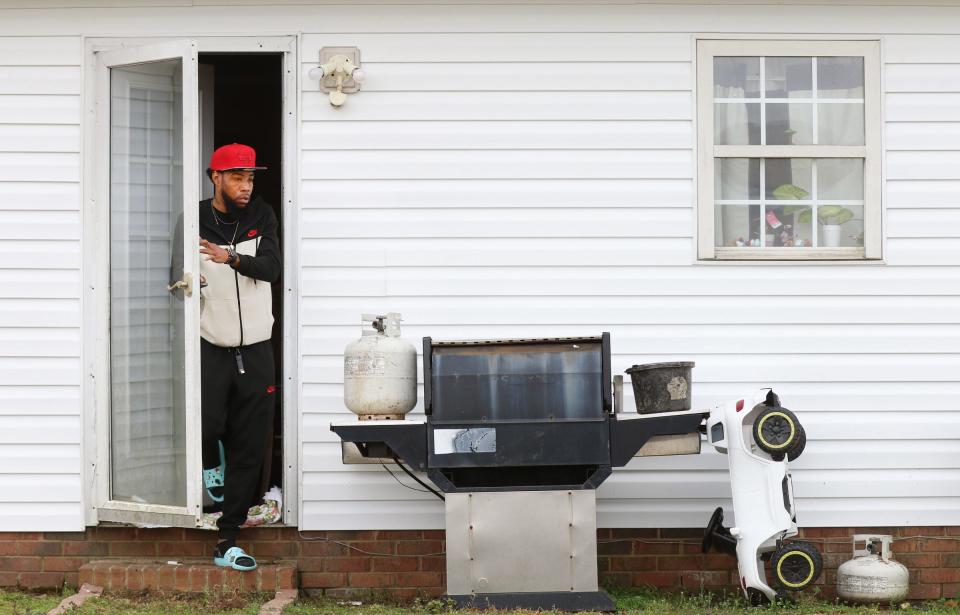A dad fights sickness as he looks for housing. Can Section 8 find him an affordable home?
Note: This story is part of a six-month investigation by USA TODAY-Southeast called "Segregated by Section 8," which followed public housing seekers and analyzed available data in new ways. Read more about the series here.
SHELBY, N.C. — Orlando Ager Jr., 36, had one hope — a coveted "Housing Choice Voucher."
A local public housing agency awarded him the Section 8 rental coupon last fall. The program is supposed to allow poor people to move into decent and safe affordable housing. But a voucher can be hard to use. And it comes with a ticking clock.
If you can't use it in time, you lose it.
Ager had lost his job because he was sick, again. His $731 monthly disability check was all the money he had coming in and it wasn’t enough for someone with five kids. Now, he needed a place to live.
Since a 2018 blaze destroyed the house where Ager and an uncle lived for four years, he had struggled to find stable housing. He once lived in a motel for three months.

State records show he spent three months behind bars following a 2019 conviction for selling or delivering drugs. Ager said he turned to crime because his health only allows him to work off-and-on, and his federal disability benefits don’t leave him with enough money to pay for child support, rent and basic needs. “That $700 a month doesn’t pay my bills,” he said.
These days, he's bounced between sleeping at his girlfriend’s house and a parent's place.
Ager worked in a factory making products for plastics until last fall when he fell ill with symptoms associated with sickle cell anemia, a blood disorder that can cause extreme pain, infections and fatigue.
Every time he starts a job, he said, he piles up absences because sickle cell anemia sends him to the hospital for days at a time. Ager, who takes up to 15 medications a day, said he went to the hospital emergency room a dozen times in the last year.
“I try not to show emotion, but I am really going through it,” Ager said. “I sometimes want to give up on finding a house, but I fight through it because I just have to find a place.”
The odds worked against him.
For more than three months, he called and applied for two-bedroom apartments and houses. Every time, Ager got rejected.
His region of North Carolina doesn't have large cities like Charlotte or Raleigh, and doesn’t have one of the nation’s hot housing markets or surging population growth. People with vouchers there have an uncommonly difficult time finding a place to live.
In four North Carolina counties – McDowell, Cleveland, Rutherford and Polk – only 40% of people who receive a voucher sign a lease before their benefits expire, said Scott Dadson, recently the executive director of a group which oversees the vouchers in that area.
That’s a lower success rate than in Charlotte, where 79% of voucher holders obtain a lease, or Richmond, Virginia, where 62% find housing, or Charleston, South Carolina, where the rate is 50%.
Segregated by Section 8: A federal program tries to house people. But it leaves many homeless and segregated in the Southeast.
It is not widely known how many voucher recipients fail to obtain a lease because the federal government does not regularly make available to the public the information it collects about success rates, said Alex Schwartz, a professor of urban policy at the New School’s Milano School of Policy, Management and Environment in New York, who has conducted research for HUD.
The most recent study from the early 2000s showed 69% of recipients nationwide signed a lease after getting a voucher, Schwartz said.
Dadson said voucher holders in Polk, Cleveland, McDowell and Rutherford counties struggle because the area suffers from a lack of affordable housing. While housing is cheaper compared to Charlotte and bigger cities, Dadson said, wages are lower, too.
Data: Section 8 housing program reinforces a Jim Crow pattern in the South

By one estimate, a person needs to make almost $18 per hour to afford the typical two-bedroom apartment in North Carolina.
Nearly a quarter of people who receive vouchers are disabled like Ager. They often rely on federal disability benefits that are on average less than minimum wage.
Dadson said voucher holders in the foothills of western North Carolina must overcome a shortage of 1,900 affordable housing units.
The issue is critical because voucher holders must find apartments or houses where the rents do not exceed the program’s limits.
Dadson said his agency is working to recruit more landlords to participate. Officials are also studying ways to convince developers to build more affordable rentals, Dadson said. “We are trying to be pro-active,” he said.
Segregated by Section 8: Flaws in the Section 8 program leave poor people trapped in ‘monstrous, depressing places’
Connecting with his son
Vouchers are part of a $22 billion-a-year program overseen by the U.S. Department of Housing and Urban Development but administered by local public housing offices.
Even as President Biden promises to expand the program to help more people, some people have been left stuck in substandard housing, motels and doubled up with family and friends despite qualifying for a voucher, a USA TODAY Network-Southeast investigation has found.
Ager had been living with his girlfriend, but said he needed to move soon. His voucher would expire in a few weeks and he had no good prospects for permanent housing.
He contacted landlords on a list provided by the local housing office. The list gives the names of landlords who accept vouchers.
Ager said none of the places he called have called him back.
“It seems like everywhere I go; I get turned around,” Ager said. “They don’t ask any questions. They always say no.”

He has always lived around Shelby, North Carolina. He graduated from Shelby High School in 2003 despite missing a significant number of days due to sickle cell anemia. He dreamed of becoming a veterinarian tech or dog trainer, but never went to college.
Ager worked in restaurants, a car wash and manufacturing plants, but his health problems sometimes leave him unable to perform labor.
It took one year on a waiting list before he got a voucher. Officials initially gave him 90 days to find a place to live.
When that deadline came and went, they gave him an extension.
By early February, Ager had not been able to use his voucher to obtain housing. His cellphone was cut off because the bill was unpaid.
In March, Ager said he received permission from his local public housing office to search outside their boundaries in Gastonia. That would allow him to live closer to his doctors in Charlotte and give him a better shot at finding a willing landlord, Ager said.
He said he needs a two-bedroom house or apartment, enough room for him and his oldest child, a 13-year-old son.
The middle-school teen plays basketball and football, but has been having problems with his schoolwork and his grades, his dad said.
“He really wants to come stay with me,” Ager said. “This would help us do better.”
Fred Clasen-Kelly is an award-winning enterprise and investigative reporter based in Charlotte, North Carolina. He is the Housing & Social Justice Ramifications reporter for USA TODAY Network-Southeast. Send story tips to fclasenkelly@gannett.com.
The team behind Segregated by Section 8
Reporting: Fred Clasen-Kelly
Visual journalism: Josh Morgan, Ariana Torrey, Mike Hensdill, Richard Burkhart
Editor: William Ramsey
Maps & Data: UNC-Charlotte’s Urban Institute with Providence Adu and Katie Zager, USA TODAY Network’s Chris Amico
Digital production & development: Ryan Hildebrandt, Spencer Holladay
Fact-checking: Rachel Berry
Proofing: Donnie Fetter, Amy Dunn
Social media, engagement & promotion: Kara Edgerson, Zach Dennis and Lauren Young
This article originally appeared on USA TODAY NETWORK: Section 8 houses for rent, buying can be hard to find despite voucher

